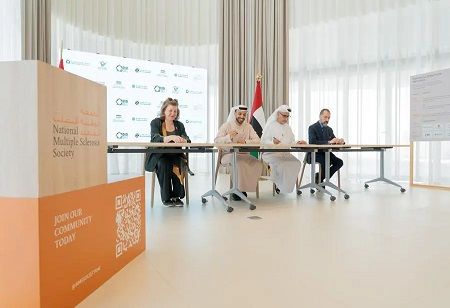-
The National Multiple Sclerosis Society (NMSS) has entered into a Memorandum of Understanding (MoU) with six of the UAE's top universities under the Universal Design for Inclusion Program. The historic agreement marks NMSS's partnership with universities, incorporating accessibility-centered learning into university curricula and equipping students to create innovative solutions that increase inclusivity.
Aimed at creating awareness regarding cognitive, mobility and communication obstacles experienced by People of Determination, the programme will enable youngsters to create inventive, accessibility-centred solutions with a view to solving actual demands.
Being one of NMSS's signature programs, the initiative works to inform and educate university students on multiple sclerosis (MS) while providing them with the proper knowledge and capability to create designs that are accessible to all people and appropriate across cultures - enhancing a more accommodating environment where each individual can fully participate in society.
Conducted in collaboration with top UAE universities, the Universal Design for Inclusion course exposes students to exploring inclusive design concepts through awareness sessions led by NMSS, workshops conducted by subject experts, and interactive forums with inclusive innovators and most crucially, the end-users—the individuals with a chronic condition. These interactive, immersive sessions enable students to better understand the challenges of People of Determination, enabling them to create effective solutions that foster accessibility and inclusion.
His Excellency Ahmed Taleb Al Shamsi, Emirates Foundation Chief Executive Officer and Vice Chair of the National Multiple Sclerosis Society, stated: "Empowering youth to become changemakers is at the heart of this program". The Youth Awareness Program is a key action in empowering a new generation of innovators who are dedicated to creating a more accessible future. It is about doing more than awareness; through the synergistic relationship of education and real-world design problems, we are making students into accessibility advocates as well as arming them with the knowledge of how to develop impactful solutions that enhance lives.
We are particularly thankful to the universities and educators who have incorporated this program into their curriculum. Their efforts have made this program possible, and it ensures that students interact with accessibility as a fundamental design principle at the beginning of their careers. This program is about action, not merely awareness. By engaging students directly in the development of solutions, we are raising a generation that not only knows about accessibility, but fights for it.
A first-of-its-kind country initiative of such scale, the program is being rolled out over six top-ranking universities, distributed across 11 campuses, i.e., Abu Dhabi University, University of Sharjah, Dubai Institute of Design and Innovation (DIDI), Khalifa University, Al Ain University, and six Higher Colleges of Technology (HCT) campuses located at Abu Dhabi, Al Ain, Dubai, Sharjah, Fujairah, and Ras Al Khaimah. The project will engage over 500 students, over 45 teaching staff and business experts, and host over 15 hands-on workshops.
Students kick-started their experience with Empathy Workshops, which gave them direct exposure to the lived reality of individuals suffering from chronic conditions. These experiential sessions engaged participants in experiencing and comprehending daily difficulties through interactive exercises, ensuring that student-driven innovations are grounded in real-world requirements. Following mentorship and learning workshops were organized involving industry experts, motivating the students with their own solutions, successful outcomes and start-ups. The accessibility activists and chronic illness advocates were also major contributors to the program, presenting real-life lessons in communication, mobility, and cognitive challenges as end-users.
Students will showcase their final prototypes to an expert panel, who will evaluate their feasibility, functionality, and potential for implementation. Exceptional projects will be awarded by an expert jury award, reaffirming the significance of inclusive, solution-focused design.
The three most successful student teams will be incorporated into the Sharjah Entrepreneurship Center (Sheraa) youth incubation hub, Startup Dojo. Through this partnership, young entrepreneurs have access to mentoring, pitch readiness, and guideance on disbursement of grants, enabling them to turn their prototypes into products.
Her Excellency Sara Belhaif Al Nuaimi, CEO of Sharjah Entrepreneurship Center (Sheraa), says: "At Sheraa, we’re proud to support the final stage of the Universal Design for Inclusion Program by welcoming the winning teams into our Startup Dojo. This reflects our commitment to empowering youth to turn inclusive ideas into scalable ventures that address real societal needs”.
She added “We believe inclusivity is key to strong, thriving communities. This program provides students valuable insight into real-world challenges and inspires practical solutions for all. At Sheraa, we’re proud to help turn these ideas into reality through mentorship and support shaping a more inclusive future.”
Sheraa shall conduct a mentoring session for winners and runners-up, walking them through the disbursement of the grants, as well as an investment pitch preparation session to prep them for making their last presentations at the awarding ceremony held in September.
In line with the UAE's national vision for inclusivity, the program reaffirms the significance of universal design in education, public areas, and community participation. Through early exposure to accessibility-led innovation, NMSS seeks to develop a future where students of all abilities work together to create a world that is not only for people of determination but with them.
In line with the UAE's Year of Community slogan, Hand in Hand, the program engages influential players throughout the ecosystem industry leaders, educators, and community members to push inclusive design. This collective action integrates accessibility at the heart of innovation, so inclusion is everyone's responsibility and makes society as a whole stronger.
🍪 Do you like Cookies?
We use cookies to ensure you get the best experience on our website. Read more...

